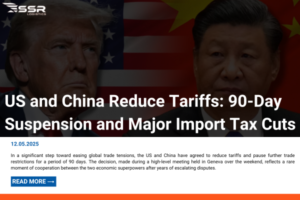The latest move where China raises tariffs on U.S. goods has sent a powerful message to the world: Beijing is fully prepared to confront any trade war initiated by Washington. This decision not only highlights China’s tough stance but also shakes global markets and pushes U.S.-China tensions to a new level.

China Raises Tariffs on U.S. Goods in Direct Response to Trump’s Trade Policy
After several weeks of showing restraint and urging for diplomatic negotiations, China ultimately made a decisive move on April 4 by officially raising tariffs on U.S. goods across a wide range of products. This sweeping tariff hike came swiftly in response to President Donald Trump’s decision to increase duties on Chinese imports, signaling a clear and calculated retaliation from Beijing in the escalating trade confrontation.
The message from China was further reinforced through its state-run media outlet, the People’s Daily, which emphasized that the Chinese government has now completely abandoned any “illusions” about reaching a quick or easy trade agreement with the United States. Instead, Beijing openly conveyed its readiness to engage in a prolonged and potentially painful economic standoff, should Washington continue to escalate trade pressures. This bold statement reflects China’s growing determination to defend its economic interests, even if it means enduring a long-term trade conflict with one of its largest trading partners.
U.S. Threatens Further Tariffs, But China Refuses to Back Down
The latest move where China raises tariffs on U.S. goods sparked an immediate and furious response from President Donald Trump. Reacting strongly to Beijing’s retaliatory measures, Trump threatened to further escalate the trade war by slapping an additional 50% tariff on Chinese products unless China backed down from its newly announced tariffs. If this threat were to materialize, the total tariffs imposed by the U.S. on Chinese goods would skyrocket well beyond the previous 34% rate – potentially exceeding even the 20% tariff level applied to sensitive fentanyl-related products.
However, despite these aggressive warnings from Washington, China’s leadership appeared to have anticipated such a scenario. Along with the latest decision where China raises tariffs on U.S. goods, Beijing has been actively rolling out a series of domestic economic support policies aimed at softening the blow of the trade war. These measures include stimulus plans to boost local consumption, financial support for domestic businesses, and initiatives to stabilize employment – all part of China’s broader strategy to fortify its economy against prolonged external pressures.
China’s Strategy: Boosting Domestic Consumption Amid the Trade War
Amid growing trade tensions, President Xi Jinping has urged efforts to maximize the consumption potential of China’s domestic market. The move comes as China raises tariffs on U.S. goods, not only as a direct retaliation but also as a key part of its long-term strategy to pivot the economy inward — reducing export dependency and boosting internal demand.
In response to rising tensions, Chinese policymakers are actively developing strategies to boost consumer spending, support local businesses, and stabilize employment. This dual approach highlights China’s determination to withstand external pressure while reinforcing its long-term economic resilience.
Global Concerns Mount as China Raises Tariffs on U.S. Goods
China’s decision to raise tariffs on U.S. goods carries significant implications that extend far beyond the scope of U.S.-China relations. This bold action has sparked growing concerns across global financial markets, with leading investment banks such as UBS, Goldman Sachs, and Morgan Stanley cautioning about the possible economic fallout if the trade war continues to intensify over time.
Adding to these concerns, analysts believe China still holds several strong countermeasures it could deploy if the situation escalates further. These include the potential devaluation of the Chinese yuan to support exports, as well as imposing stricter regulations on the export of key strategic resources, which could place additional pressure on the U.S. and global supply chains.
Stay updated with the latest import-export news on SSR Logistics News.
Source: Bloomberg









